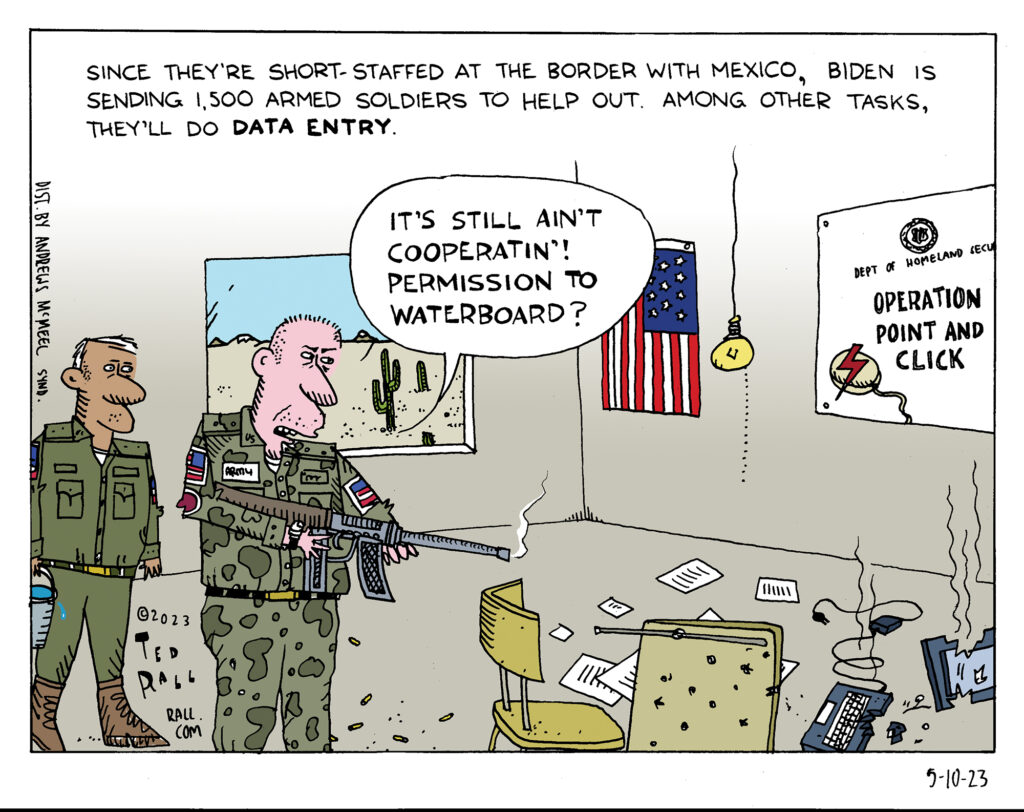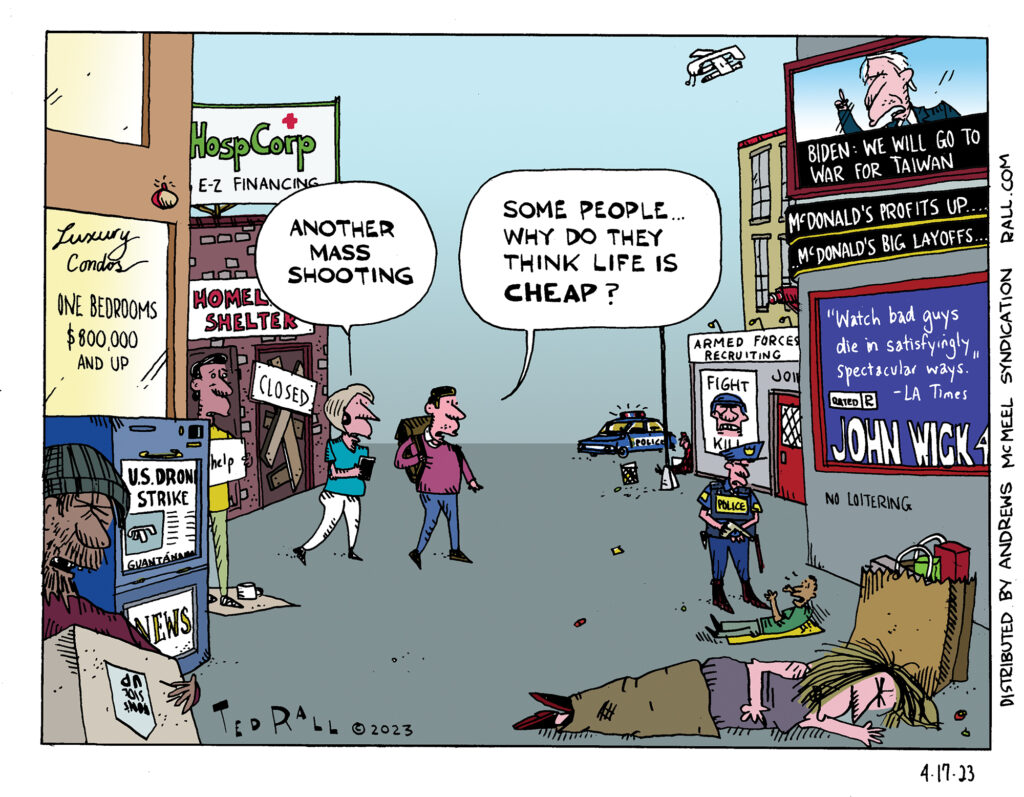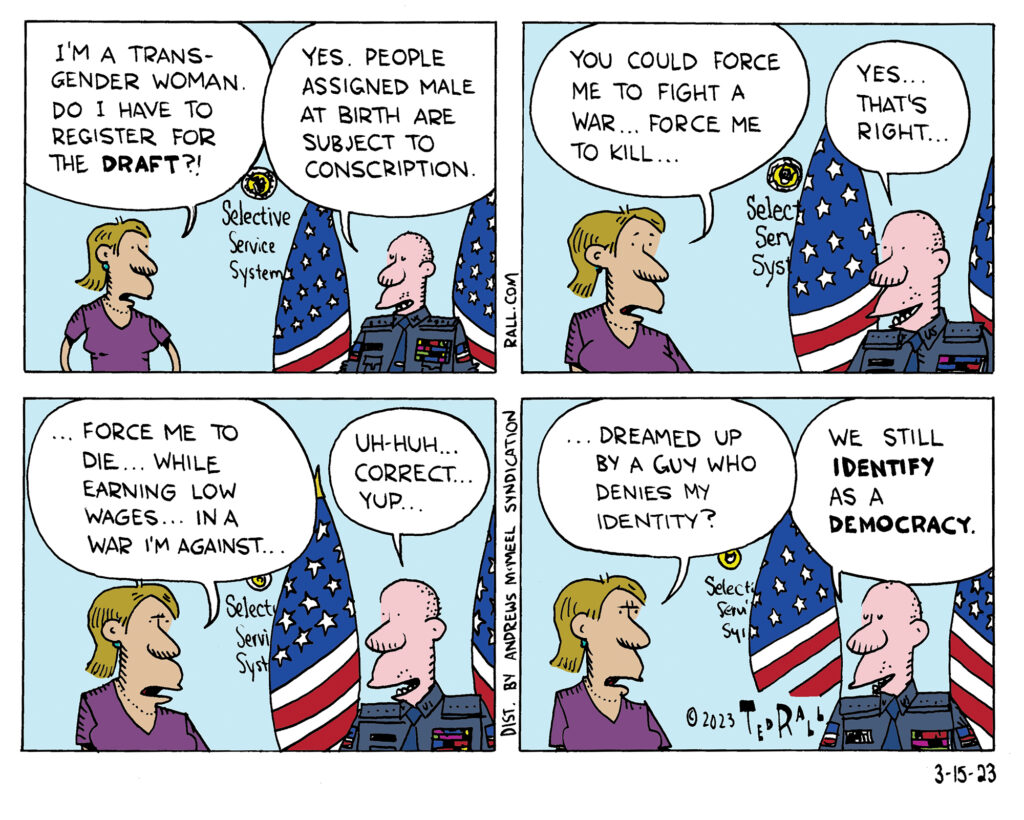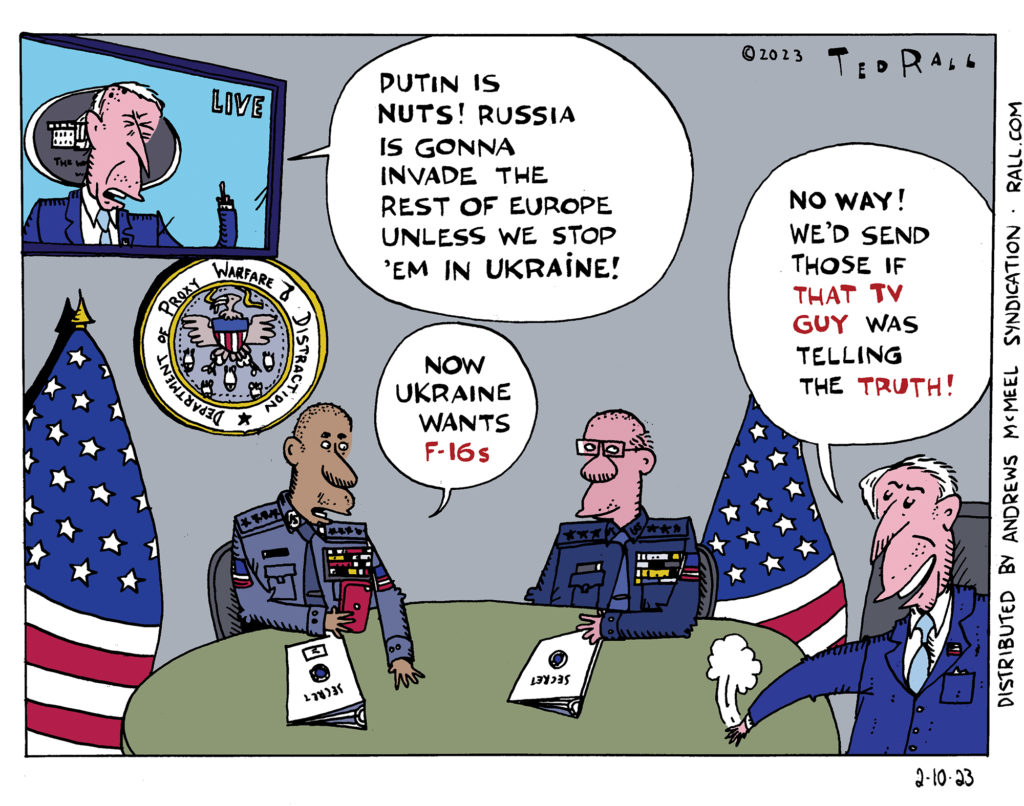President Biden wants to send $106 billion to Ukraine and Israel. That’s five times the amount of money that it would take to make sure no American is sleeping on the street this winter. Leftist political cartoonist Ted Rall does not think this is OK.
DMZ America Podcast #121: Israel Playing Into Hamas’ Plans, House Speaker Crisis, Biden’s Terrifying Speech
Editorial Cartoonists Ted Rall (from the political Left) and Scott Stantis (from the political Right) discuss national and international events of the week.
First up: as we enter the third week of the war between Hamas and Israel in the Gaza Strip, there are rising fears of regional escalation. Has Hezbollah agreed to open a second front against Israel? Will Iran attack Israel? How long will it take Israel to overthrow the Hamas government and what kind of regime do they plan to install if and when they succeed? Right now, it looks like they are poised to repeat the mistakes America made in Afghanistan, Iraq and Libya.
In the second segment of the podcast, Ted and Scott discuss the constitutional crisis created by the Republican Party’s inability to choose a Speaker of the House of Representatives. Steve, Scalise and Jim Jordan are both out. Will the speakership ultimately wind up in the hands of an obscure congressman? In the meantime, congressional business has ground to a standstill.
Finally, Ted and Scott react to President Biden’s second Oval Office speech since he became president. Squinting, unable to read the Teleprompter, tripping over his words and slurring, this was an extremely disturbing performance that seems to belie Democrats’ claim that he is a viable candidate for 2024. Will he resign? Step aside mid-campaign? Or try to muddle through somehow to reelection? Scott and Ted also discuss the substance of Biden’s speech: his attempt to link the Ukraine and Israel conflicts.
Watch the Video Version of the DMZ America Podcast:
DMZ America Podcast Ep 121 Sec 1: Israel Playing Into Hamas’ Plans
DMZ America Podcast Ep 121 Sec 2: House Speaker Crisis
DMZ America Podcast Ep 121 Sec 3: Biden’s Terrifying Speech
Israel Should Respond, Not React

In the days and weeks and months and years after 9/11, when you questioned how the Bush Administration responded to the terrorist attacks by Al Qaeda, right-wing Republicans and liberal Democrats alike answered with a passive shrug. “Well,” they said, “we had to do something.”
Then you pressed about Bush’s specific responses—those somethings. Invading Afghanistan, which had nothing to do with 9/11. The USA-Patriot Act, which stripped away our rights and Congressmen didn’t bother to read. Guantánamo. Torture. Extraordinary rendition. Drones. Same reply: “We had to do something.”
Invading Iraq? Not that. Bush crossed his own line in the sand there.
Hamas’ violent incursion from the Israeli-occupied Gaza Strip into Israel—re-read the preceding prepositional phrase, for it encapsulates the insanity of the situation—was instantly described as Israel’s 9/11. Like the United States 22 years ago, Israel is not responding. It is reacting.
They (feel that they) have to do something. That (feeling) is understandable.
However, logic is supposed to kick in next. Israelis should ask themselves: Do they really have to do something?
Did we, following 9/11?
If so, if something must be done, there are many options. Must “doing something” include military force?
In 2007, at the height of the “war on terror,” Harvard convened a panel of experts in order to evaluate Bush’s post-9/11 actions. Participants were asked: “Are terrorists simply insane, barbaric, nihilistic, as others have theorized?” Obviously not. “Terrorists want three things, Harvard political science professor and terrorism specialist Louise Richardson said: “revenge, renown, and reaction.”
Richardson argued that “to assume that being tough on terrorism means being effective against it” is a mistake. Trying to defeat terrorists through military means, she said, allows them to achieve revenge, renown, and reaction—exactly what they want. “By declaring war on terrorism, we’re playing exactly into their hands. We’re conceding the very objective they are trying to achieve.” The war on terror killed nearly a million people and cost $8 trillion. What a waste! From Shanksville to Kabul to Baghdad to the Be’eri Kibbutz, neither terrorism as a tactic generally nor radical Islamist terrorism specifically has lost an inch of ground.
America’s number-one client state is repeating our error.
“There is a sense of helplessness, but we are all now trying to become proactive,” Aviram Meir, whose nephew was taken hostage by Hamas on October 7th, told an Israeli reporter. “We have to do something.”
A normal impulse.
A normal impulse that should be resisted.
“Human animals,” Israeli Defense Minister Yoav Gallant called members of Hamas as he, rather animalistically himself, announced that he would cut off food and water to 2.3 million people, 99.9999% of whom had no involvement in the Hamas attacks. His choice of words, so dehumanizing and redundant, is ironic. Taking a pause to think before you respond to sensory input—the difference between acting and reacting—is not only a big evolutionary advantage that human beings have over other animals, but the essence of what it means to be a civilized person.
Gallant and other Israelis howling for quick vengeance ought to refer to the psychologist Viktor Frankl, best known for “Man’s Search for Meaning,” a classic book informed by three years at Auschwitz. “Between stimulus and response,” Frankl wrote, there is a space. In that space is our power to choose our response. In our response lies our growth and our freedom.”
Gallant aside, even the animals we choose to keep near us have this trait. An animal suited for domestication, scientists say, does not panic when startled.
Hamas’ October 7th operation was meticulously researched and planned. It is not even slightly likely that Hamas leadership did not foresee the Israeli response that we are seeing: a brutal bombing campaign followed by a massive ground invasion determined to replace the Hamas government with a puppet regime. Rule one of strategy: when you find yourself following a predictable set of actions, your enemy is winning.
Perhaps Hamas, like the Iraqi resistance in Fallujah, has rigged Gaza with boobytraps. Maybe Sunni Hamas has a regional ex deus machina up its sleeve, like a game-changing promise from Shia Hezbollah open up a second front against Israel, and/or a commitment from Syria, which could point to Israeli bombing of its civilian airports as casi bellis. And/or Hamas is playing a long game, in which Israel’s Geneva Conventions-shattering bombings of schools and hospitals, targeting of Palestinian children and other forms of internationally-proscribed collective punishment erase the memory of the atrocities committed by Hamas and decisively turn the world against the Jewish state.
If I were sitting in an Israeli war room planning my nation’s next move, I’d be worried sick about these possibilities/probabilities.
I would argue: there’s no rush to invade Gaza. Vengeance is a dish best served cold or at least after time to think.
There are numerous other options.
Israel could turn the power back on, let food and water back in and beef up its lame security along its border with Gaza. It could treat the attacks as a police matter and demand that Hamas turn over suspects for prosecution. It could jumpstart negotiations to finalize a two-state solution, which everyone knows is the only viable long-term solution to the Israeli-Palestinian conflict. It could embrace the wisdom of Nelson Mandela, who understood that a cycle of violence would never end unless one side, the side in charge that happened to be the African National Congress after he was elected president, declared amnesty so the country could move past apartheid. And if it finally did—after careful consideration—decide to invade Gaza, it could so with full knowledge and understanding of what form of governance would follow Hamas.
Nothing is stupider than the blind urge to do something, anything, whatever, after an act of terror. Nothing leads to worse responses.
“We have to defend. We have to do something.” Those are the words of Maisa Khader, a 38-year-old chemist, in 2021. She was Palestinian, attending a pro-Hamas rally in Gaza. She was angry about Israel’s latest bombing blitz against the people of Gaza.
(Ted Rall (Twitter: @tedrall), the political cartoonist, columnist and graphic novelist, co-hosts the left-vs-right DMZ America podcast with fellow cartoonist Scott Stantis. You can support Ted’s hard-hitting political cartoons and columns and see his work first by sponsoring his work on Patreon.)
Whoever Said Life Was Cheap?
A 23-year-old man was the latest mass shooter to make the headlines, this time at a bank in Louisville, Kentucky, where he was an employee. As usual, Democrats called for increased gun control. Republicans blamed the mental health crisis. Both parties have a point. But we also shouldn’t ignore something unique to America, a brutal culture of violence that permeates our politics, pop culture and our everyday lives.
War for Taiwan? It Would Be Our Craziest War Ever
 America and the West have begun promoting the idea of a war against China over Taiwan. If China invades Taiwan, President Biden has said, the U.S. would go further than it has in Ukraine, sending American ground troops as well as weapons. 37% of American voters agree with Biden. But how do you go to war to defend a country from invading itself?
America and the West have begun promoting the idea of a war against China over Taiwan. If China invades Taiwan, President Biden has said, the U.S. would go further than it has in Ukraine, sending American ground troops as well as weapons. 37% of American voters agree with Biden. But how do you go to war to defend a country from invading itself?
According to the U.S., the U.N. and most of the world—including Taiwan itself—Taiwan is part of China.
Can the U.S. invade Ohio?
Like many other nations places, Taiwan is in a tough spot caused by decisions made by U.S. policymakers many years ago.
Until 1945 Taiwan was a Japanese colony. The birth certificate of my former father-in-law, an ethnic Taiwanese, read “Taipei, Japan.” The end of World War II brought a breather. Occupation forces withdrew. The Taiwanese expected independence as part of postwar decolonization. But America had other plans.
Across the Taiwan Strait, the Chinese civil war was drawing to a close. Mao Tse-Tung’s Communists were beating the far-right Nationalists (KMT) led by Chiang Kai-shek. The Nationalists, looting everything they could carry including China’s gold reserves, jumped aboard U.S. ships helpfully provided by President Harry Truman and fled to Taiwan. The exiled KMT took over, purged and murdered Taiwanese intellectuals and independence advocates and established a vicious authoritarian dictatorship of the type propped up by the U.S. around the globe during the Cold War. There was a remarkably calm transition to democracy following Chiang’s death.
“When,” my father-in-law would ask me during one of our long political discussions, “will the United States give independence to Taiwan?”
“Whether it’s the U.S. splitting from Britain, or East Timor,” I replied, “independence is taken, not given. You declare independence.” 1,400 Timorese died after declaring independence from Indonesia.
“We can’t do that,” he’d say. “China will invade. Many people will be killed.”
“Maybe they’d invade,” I’d replied. “Maybe not. But there’s no other way.”
The Taiwanese people are unwilling to die. So Taiwan has never declared independence. Since the founding of the People’s Republic in 1949, the island of Taiwan—whose legal name is the Republic of China—and mainland China have agreed on the legal fiction that Taiwan and China are part of the same country. Beijing calls Taiwan “a renegade province” it wants back in its fold; Taipei’s government, heir to the defeated Nationalist troops who fled to exile across the Taiwan Strait when the Communists seized power in 1949, officially maintains the ridiculous position that someday it will reconquer the mainland.
Mouse eats cat.
Like Kurdistan, Palestine and Pakistani Kashmir, Taiwan lingers in diplomatic purgatory, its people semi-stateless. It enjoys robust economic growth and de facto independence. But it’s not really a country. It has no seat at the U.N. Only 13 nations, most of the tiny—Belize, Haiti, Vatican City, Honduras, the Marshall Islands, Nauru, Palau, Paraguay, Saint Kitts and Nevis, Saint Lucia, Saint Vincent and the Grenadines, Tuvalu and Guatemala—recognize Taiwan as a country. Even its primary benefactor, the U.S., does not recognize it.
Yet Taiwan is different. Always on the periphery, the Chinese empire’s control of the island waxed and waned in proportion to its political stability and military strength, allowing the Taiwanese as well as the ethnic Han Chinese who migrated there from the mainland, to develop their own arts, food, and political and economic cultures. Seventy years of diplomatic limbo and de facto independence—their own coins, stamps, military—have accelerated those trends and made them feel permanent. They don’t want to be absorbed into the Borg, like Hong Kong.
It isn’t hard to see why Taiwan’s people embrace the strategic ambiguity of diplomatic limbo. Life is good and getting better, money is rolling in, and—bluster aside—China seems unwilling to risk the chaos and economic cost of reclaiming an island it hasn’t had under direct control since the 19th century. Why fix the unbroken?
Except—it is a broken situation. You can’t have national pride until you’re a nation. You can’t demand respect unless your people demonstrate courage. Most of all, there’s the question of what the future holds: President Xi Jinping seems smart enough not to try to put the band back together again, at least not via hard (military) power. What about his successor or his successor’s successor?
Every now and then some Taiwanese political theorist gins up a farfetched workaround that promises to deliver independence without the risk of Chinese tanks rolling through Taipei. The 51 Club, founded in 1994 with 51 members, is a Taiwanese organization dedicated to the goal of turning the island into the 51st state of the United States. Presto! War with Taiwan is war against the United States—something the Chinese would never want.
The idea hasn’t exactly caught fire. “All the PLA [People’s Liberation Army] has to do is lob a few missiles over, and people will be swarming to us,” founder David Choi predicted in 1994. No missiles yet.
Annette Lu, former vice president of Taiwan under the KMT, promotes One Zhonghua, a scheme under which Taiwan and China would form an economic commonwealth like the European Union, with economic integration and political independence. Neither the Chinese nor the Taiwanese are on board.
There’s also a theory that the U.S. is, under international law, has been—and still is—the administrator of Taiwan since World War II. In 1945, the U.S. appointed Chiang’s Republic of China (KMT) to administer Taiwan—think of it like a sublet. The San Francisco Peace Treaty didn’t go into effect until seven years later, in 1952. “The treaty never mentioned who would receive Taiwan. Japan surrendered its former colony, but it never said to whom,” writes The Taipei Times. So who gets it? “Regarding Taiwan, the official U.S. position was, is and continues to be that it is ‘undecided.’” Biden may be hanging his hat on this bit of unfinished business.
From a domestic U.S. political perspective, however, whatever enthusiasm Americans have for defending Taiwan would vanish as soon as they learn that we would be risking World War III over a “country” that isn’t even a country—and doesn’t claim to be. The United States has gotten itself into a lot of stupid wars, but this would be the craziest one ever.
(Ted Rall (Twitter: @tedrall), the political cartoonist, columnist and graphic novelist, co-hosts the left-vs-right DMZ America podcast with fellow cartoonist Scott Stantis. You can support Ted’s hard-hitting political cartoons and columns and see his work first by sponsoring his work on Patreon.)
DMZ America Podcast #92 (plus Video Version): Are SVB and Signature Bank Just the Beginning? When Did the GOP Become the Peace Party? Things Seem Unreal Since Reality is Now Subjective
Internationally-syndicated cartoonists Ted Rall (from the Left) and Scott Stantis (from the Right) discuss the week’s pressing issues. In Segment One they break down the banking crisis, weighing the causes of the Silicon Valley Bank and Signature failures and what the repercussions may be. (Ted also congratulates Scott on his warnings that the Federal Reserve Board was pushing its anti-inflation rate increases far too hard, with the bank failures being the early results of those policies.) Next, Scott and Ted get you up-to-date on the most recent events in Ukraine. Which raises the question: will Ted join the Republican Party because of its ever growing antiwar stance on the Russia-Ukrainian conflict? Lastly, the boys discuss the growing notion that reality is subjective since we all seem to subscribe to our own version of what is real. A far-reaching and incredibly interesting DMZ America Podcast.
If you liked the Audio version above, you may also enjoy the Video version of the DMZ America Podcast:
DMZ America Podcast Ep 92 Sec 1: Are SVB and Signature Bank Just the Beginning?
DMZ America Podcast Ep 92 Sec 2: When Did the GOP Become the Peace Party?
DMZ America Podcast Ep92 Sec 3: Things Seem Unreal Since Reality is Now Subjective
We Still Identify As a Democracy
The Biden Administration has decided to continue the Trump Administration’s policy of requiring transgender women who were assigned at birth as male to register under the Selective Service System for military service.
Believe What I Do, Not What I Say
Biden administration officials claim that Russia has dastardly plans to invade Eastern Europe unless it is stopped in Ukraine. If they really believed that, however, they wouldn’t be hesitant to send whatever weapons and troops were required to stop them. That overheated rhetoric is just a pose. Which is why the US has given Ukraine just enough weapons to keep fighting but never to win.





